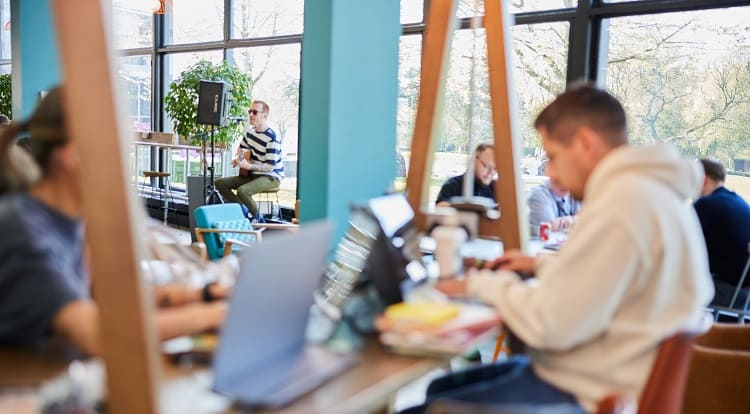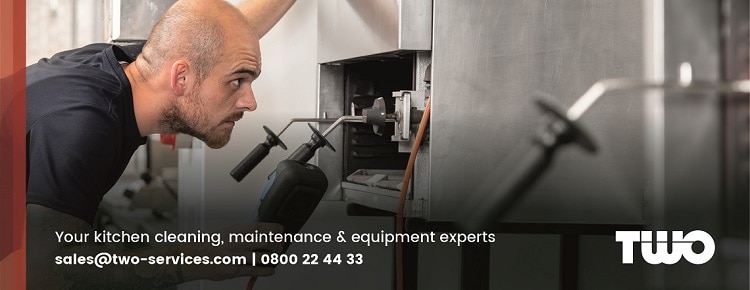By Angela Green
Catering News is sponsored by Two Services

UK employers who encourage their teams to take longer, better quality and more frequent breaks could hold the key to unlocking productivity, improving employee wellbeing, and enticing more people back to work, reveals new research from Compass Group.
Analysing insights from 35,000 workers across 26 countries, Compass Group’s Global Eating at Work Survey 2023 found that the length of time workers spend on their main lunch break varies considerably as you look around the world, from 54 minutes in China to a little over 20 minutes in Poland.
The research reveals that UK workers today are taking less than 33 minutes per day for their main lunch break, if they have one at all, reducing opportunities to rest, recharge and socialise with colleagues.
UK employees working five days a week were found to skip one lunch break per week, while nearly half (48%) of UK workers eat their lunch alone.
At risk of burnout, 10% of UK workers said they take no breaks at all during their working week. This trend peaks at 17% for workers in the Senior Living industry, compared to 12% of workers who are workplace-based and just 5% of home-based workers.
Employers who invest in quality breakout areas and food and drink offerings can positively influence the productivity and wellbeing of their workforce.
73% of UK workers said that taking a lunch break makes them more productive.
82% of UK workers said that taking regular breaks throughout a workday improves their overall productivity, with 7 in 10 employees using these breaks to eat and drink.
In support of employee wellbeing, 70% of UK workers think it’s important that employers provide a place at work where they can take a proper break to relax and recharge.
Across all age groups, different generations want different things from their breaks at work, highlighting the need for employers to tailor breakout areas to match the wellbeing requirements of their unique workforce mix.
Eating and drinking during a break is the top priority for every age group, especially UK Gen X and Baby Boomers.
Younger Gen Z and Millennial workers want to use their time for more diverse pursuits that support their mental health, including relaxing, socialising with colleagues, and pursuing personal interests or hobbies.
The research shows that employees are significantly more likely to socialise and network with colleagues during breaks if they are provided with food and drink facilities at work. The more advanced the food offer provided, the stronger this trend becomes.
In workplaces with an advanced* food offering, 70% of workers choose to eat lunch with colleagues and only 23% eat by themselves.
In contrast, when no food and drink facilities are provided just 38% interact with colleagues during their main break nearly while nearly half (48%) choose to eat alone.
Employers need to compete with home comforts if they want to encourage home-workers back into the workplace.
57% of UK workers say they can truly relax during breaks at home versus just 44% for breaks in the workplace.
Despite workers stressing how important it is for employers to provide facilities where they can take a proper break, only 24% of UK employers currently provide a staff restaurant on-site, while more than a third (37%) of UK workers say their workplace doesn’t have a suitable breakout area for them to relax and recharge.
Morag Freathy, Managing Director, Eurest, commenting on the research said: “With productivity a key challenge facing businesses today, enabling employees to take time out of their working day to relax and recharge with colleagues can make a huge difference. Though it seems counterintuitive, high-quality breaks are a win-win for employees and employers alike, proven to enhance workers’ productivity, collaboration and mental health.
“Taking a lunch break is no longer a routine event at a set time of day. With the rise of flexible working, UK employees now expect to refuel however and whenever suits them best. They want convenient and good quality food and drink to recharge and provide an energy boost, comfortable places to sit, network and socialise with colleagues, and a workplace culture where breaks are encouraged, not frowned upon.”
Matt Thomas, Managing Director, Restaurant Associates, added: “For employers looking to motivate their teams, attract new talent and encourage hybrid workers back into the workplace, we’re seeing greater investment in the “hotelisation” of workspaces. This involves creating comfortable breakout areas which reflect the diverse needs of workers while providing food experiences and opportunities for social interaction which people can’t replicate at home.”
Eurest and Restaurant Associates are two of Compass Group UK & Ireland’s leading brands, providing catering to thousands of employees in the workplace, across the UK.

